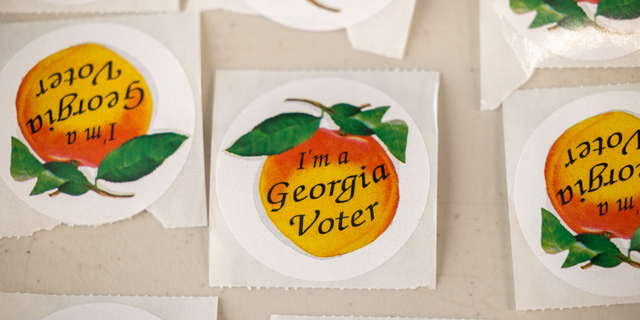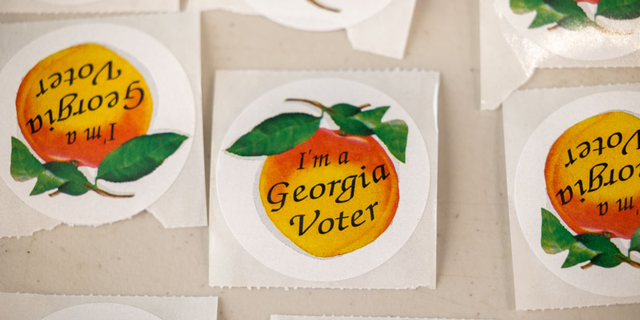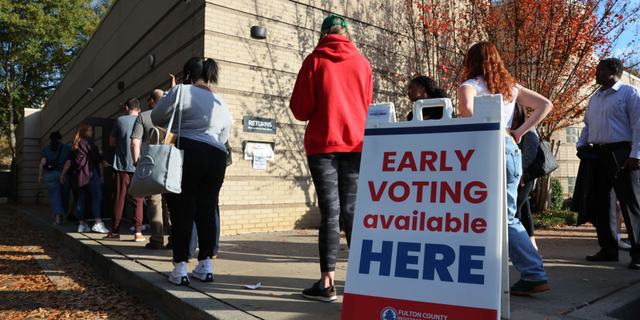
A federal judge in Georgia temporarily blocked a provision in the state’s voting law barring people from giving food and water to voters waiting in line to vote on election day, and stopped a requirement that voters include their date of birth on their absentee ballots.
U.S. District Judge J.P. Boulee is still allowing the enforcement of penalties against people who provide food and water to voters waiting in line if they are within 150 feet of the building where voting is taking place. But the judge paused enforcement of the ban in other areas within 25 feet of a voter standing in line.
“Central to this conclusion was the fact that, unlike the Buffer Zone’s reasonable 150-foot radius, the Supplemental Zone has no boundary,” he wrote. “S.B. 202 prohibits organizations (such as Plaintiffs) from engaging in line relief activities in the Supplemental Zone, i.e., if they are within twenty-five feet of a voter—even if the organizations are outside the 150-foot Buffer Zone.”
Boulee also blocked a part of the law requiring voters to provide their date of birth on the outer envelopes of absentee ballots. He wrote that the state “did not present any evidence that absentee ballots rejected for failure to comply with the Birthdate Requirement were fraudulent ballots.”
GEORGIA EARLY VOTING SETS ALL-TIME RECORD FOR MIDTERM ELECTION DESPITE CLAIMS OF VOTER SUPPRESSION

A federal judge in Georgia temporarily blocked a provision in the state’s voting law barring people from giving food and water to voters waiting in line to vote on election day. (Getty)
But the judge rejected the groups’ claims that certain restrictions imposed by the law deny voters with disabilities meaningful access to absentee voting.
The Election Integrity Act was passed by state lawmakers and signed into law by GOP Gov. Brian Kemp in the spring of 2021. Other provisions in the law include requiring identification to vote, extending the early voting period and ensuring a ballot drop box will be available in every county.
The controversial election law seeking to strengthen voting rules came shortly after the 2020 election and prompted criticism from Democrats and large corporations, including Major League Baseball and Coca-Cola. The MLB moved its 2021 All-Star Game from Atlanta to Denver in response to the election law.
Critics of the law, including President Biden and twice-failed Georgia gubernatorial candidate Stacey Abrams, claimed it would restrict voting access, particularly for people of color. But Georgia saw record turnout in the primary and general elections in 2022, leading Republicans to argue the criticism was not justified.
Several civil rights and voting rights groups filed a lawsuit challenging the law.
DESANTIS MEETS WITH KEMP AMID TRUMP CASE, IMPEACHMENT CALLS AGAINST FANI WILLIS

The judge blocked a requirement that voters include their date of birth on their absentee ballots. (Getty)
Both sides declared victory after Boulee’s mixed ruling on Friday.
NAACP Legal Defense Fund assistant counsel John Cusick said in a statement that the decisions “are important wins for our democracy and protecting access to the ballot box in Georgia.”
Georgia Secretary of State Brad Raffensperger said the Peach State “continues to have one of the most secure and accessible voting systems in the country for all voters, including voters with disabilities.”
“I am glad that the court upheld Georgia’s common sense rules banning ballot harvesting and securing absentee ballot drop boxes,” he said in a news release. “Georgia’s voting system is accessible to all voters, with multiple options for voters to choose how they want to exercise their right to vote.”
A ruling on Texas’ election law, which is similar to the one in Georgia, was also handed down Friday from a federal judge.

The Election Integrity Act was passed by state lawmakers and signed into law by GOP Gov. Brian Kemp in the spring of 2021. (Elijah Nouvelage/Bloomberg via Getty Images)
CLICK HERE TO GET THE FOX NEWS APP
U.S. District Judge Xavier Rodriguez struck down a provision of Texas’ law requiring mail voters to provide the same identification number they used when they registered to vote. He ruled the requirement violated the U.S. Civil Rights Act because it prevented people from being able to cast ballots over an issue irrelevant to whether they are registered.
The provision led to skyrocketing mail ballot rejections in the first election after the law was passed in September 2021, and the U.S. Department of Justice challenged the provision.
“This ruling sends a clear message that states may not impose unlawful and unnecessary requirements that disenfranchise eligible voters seeking to participate in our democracy,” Assistant Attorney General Kristen Clarke said in a statement after the ruling.
Several election integrity bills have passed in GOP-controlled states since 2020 after the election that year.
The Associated Press contributed to this report.








